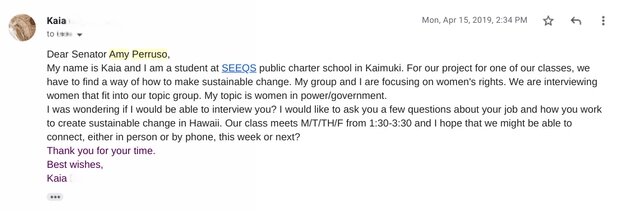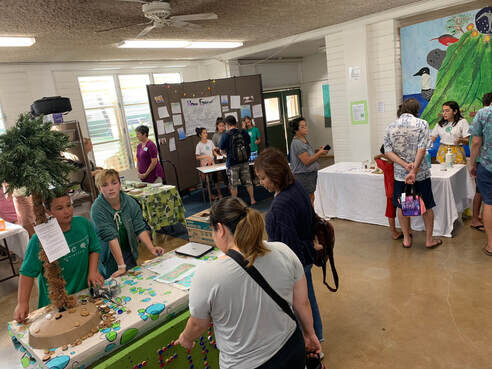
Communicating Powerfully
When in places where they speak a different language, you need to Communicate Powerfully in a way that will hopefully help others to understand you.
New York City, New York, United States
Communicating Powerfully means to effectively express or convey a message. When you Communicate Powerfully, your audience should understand what you are trying to express, as well as hopefully relate to it and take something from your performance. To use this skill, you must be aware of your audience, and in performance you must be able to pick up on things such as body language and facial expressions to determine if your listeners are engaged. You should be organized and effectively prepared when you communicate, ready to take on any challenge. You should also know how to best demonstrate your message in order for it to be communicated in a clear and interesting way. To Communicate Powerfully, you have to have the bravery to speak your mind and show what you feel. Not only is Communicating Powerfully about presenting for yourself, but it is also presenting for the benefit of others and for the greater good.
My Understanding
A counter-example of Communicating Powerfully would be not observing your audience and therefore not being aware of what they want and expect from you, or not communicating your ideas in a way that makes sense to others. When you don’t Communicate Powerfully, you are not able to successfully pass on your ideas and opinions and don’t end up communicating your message. In the context of oral communication, not Communicating Powerfully would look like speaking quietly, not being organized and prepared, and not being able to take clues from your audience to be able to engage them.
One way that I use Communicating Powerfully is when talking to different groups of people. If I was talking to my friends or my teachers, I would use different words and present myself differently to these two groups of people. When I’m with my friends I might abbreviate my words or use more informal language, whereas with my teachers I would try to present myself professionally and talk to them respectfully. This shows that I am Communicating Powerfully because I am aware of my audience and can express myself differently based on that.
Another way that I use Communicating Powerfully is in school. In class, we are sometimes asked to do presentations or to speak to the class. I use Communicating Powerfully to make sure my presentation is organized and well thought out. I need to make sure I do research and preparation beforehand, as well as being organized with everything I have to say. I pick up on clues like body language from my audience while presenting, and use that to improve my presentation/communication by knowing what my audience wants and expects, and what makes them the most interested. I can also know when I should elaborate on something if my audience is looking interested, and when I should move on from a topic when my audience is looking bored. As I practice presenting more and more, I will continue learn to engage my audience by having good body language, eye contact, etc. I will also know what are interesting topics for people, as well as if using an exciting voice works to engage my listeners more. With practice, these skills will become more and more improved until they are just a habit.
I also use Communicating Powerfully in my personal life. When having conversations with family, friends, teachers, and peers I may disagree with something or have something I want to say. Communicating Powerfully can help me make good points, choose the best medium to express them, and know how to explain what I am trying to say clearly. I can also show that I've been listening by referring back to what the other person has said. For example, when talking to a friend or family member, it’s important to show that I’ve been listening to them as well as making my own points. This shows that I am both being respectful and engaged in the conversation.
One situation I think Communicating Powerfully would be very helpful in the future is for a job interview or college interview. These past couple of months when I have had to do interviews for private high schools, I needed to Communicate Powerfully by answering questions effectively but concisely, and also having good body posture and eye contact to engage my interviewer. Additionally, I needed to be able to think of interesting answers to questions on the spot and make sure it was accurate to the question I was asked. When applying for a job, you generally need to come across as likable and suitable for the task. To successfully have this interview, you need to think about what your audience is expecting and wanting to hear and make it your own in some way that they will find interesting. Although this can be challenging, I think it is necessary and a very good skill to have.
My Growth
In sixth grade, I thought that Communicating Powerfully meant being able to speak clearly and loudly. This was a challenge for me because my shyness combined with a lack of self confidence means that I'm not very good at presentations at school or even sharing my opinion when having discussions with friends. I don’t believe I am very good at presentations because sometimes I freeze up, talk too quickly, or don’t make very good points. This is definitely an area for future growth, though I also feel like I have grown a lot since sixth grade, because I don’t get nearly as nervous for presentations and I used to and I get better grades on them. This is a part of Communicating Powerfully that I’ve always struggled with, but also feel like I've grown a lot in. For example, for my Science Roller Coaster Presentation in 8th Grade, we had to make a slideshow and talk about our project. I was able to do this effectively by taking deep breaths before it was my turn to talk and making sure I had notes to keep me on track.
One way that I feel I have been able to successfully Communicate Powerfully throughout all my three years here is in my writing, essays, and stories. Feeling proud of something and having the confidence to share it with others was a big contributor to this. I tend to communicate better in writing because it is something I feel very comfortable with and feel that I have practice doing. It’s also a lot easier for me to communicate this way and I can usually feel proud of the writing that I create. This is a part of Communicating Powerfully that I feel like I’ve always been pretty good at.
A project that helped me to grow in Communicating Powerfully was for Art in sixth grade, and it was a monologue. I remember I had been preparing and practicing my lines in the mirror for so long, but I was still so nervous. During my monologue, I don’t think I was Communicating Powerfully because I wasn’t really listening to my audience and I wasn’t very organized, two main parts of this skill. Although I had been practicing, I could have done it more with an audience so that I would be more prepared to have a group of people watching me. I wasn't very organized because while presenting, I was staring off to the side, playing with my hair and clothes, and was distracted.
The Monologue I Read
Now, when I need to present information to the class I focus on my audience. I am able to observe and pick up clues on what interests them and what doesn’t, as well as know how to present to the best of my ability. I know that my audience is engaged when they are nodding or smiling at what I’m saying or doing, as well as looking at me. If they look bored, tired, uninterested, or aren’t looking at me then I know my audience isn’t engaged. When my audience is not looking engaged, I can try to make my voice uplifted, my posture straight, and make sure to smile. I think that this is a skill I learned pretty early on at SEEQS and have been using ever since.
Another part of Communicating Powerfully that I was able to understand only recently is that it isn’t just about speaking. Communication can come in many different forms, such as oral, written, performance or creative expression. Art, music, dance, body language, and writing are some of the many examples of this skill. I think that this is a very important aspect of this Sustainability Skill, and learning that communication can come in many different ways shows some of my growth.
Communicating Powerfully means to know when and how to speak effectively, and to be aware of your audience and of yourself. I didn't have this understanding of the skill in sixth grade, and I am proud of that growth in understanding what this skill really means. I think that by understanding these parts of the skill, I have also been able to incorporate them more into my life. For example, for our Kama’aina Interview and Action Project in eighth grade, I interviewed someone in my community and then made a slideshow presentation about what I had learned. I think that I demonstrated the other aspects of Communicating Powerfully in this project because I was not only thinking about my audience, but I was also organized with my ideas and was able to communicate a powerful message, as well as (hopefully) leaving something with my audience.
These examples show that I have gotten better at both my understanding and execution of Communicating Powerfully since sixth grade in my presentations, observing my audience, and being able to get across a clear and concise message.
My Project
An assignment that helped me grow in Communicating Powerfully was my sixth grade EQS Project. I was in EQS Changemakers, and our essential question was: “How can we make sustainable change?” We did this by choosing projects that would make a difference in our school community or a wider community in the neighborhood around our school.
In order to get started, we first had to decide if we were working in a group or on our own, and what topic we wanted to focus on. Then we had to think of project ideas and choose the one that best served our message. This was the document I used to think of ideas. My group (Zephyr, Genisis, Taryn, and I) decided to host a “Women’s Event” at our school, where we would have local women artists come and give talks about their work. We would also have a mini art gallery with work from those who were visual artists, and videos from those who were filmmakers. Needless to say, we ended up not having enough time to complete this project, and ended up deciding to interview local women instead and write a book about what they said. Our medium changed, and therefore our audience changed. We needed to consider the following factors: how to make our new project idea unique, our time frame, what would best serve our message, what project we felt the most excited about, and what the world needed at the moment, among other things. Without considering our audience’s needs, then we wouldn’t know what our audience wanted to hear from us, as well as what they were expecting. When we can take clues from our audience, we are able to tailor our ideas into what would interest and attract them the most.
To start our new idea, we had to start our process from the beginning again. We knew we wanted to conduct interviews and write a book based on what we had learned. We each had a different industry that we wanted to focus on: Zephyr wanted to interview directors, I interviewed women in power/government (Representative Amy Perusso and Representative Tina Wildberger), Genisis interviewed models, and Taryn interviewed visual artists. Our first step was to do research on the people that we wanted to interview. I looked things up online, as well as talked to some of my peers and teachers about whether they knew anyone who might be interested. I made sure that I asked more people than I actually planned to interview because I knew some of them wouldn’t reply or would be too busy to set up an interview time.
Once I had a list of possible interviewees, I started to draft emails. Since my two subjects were state representatives, I had to be respectful and use proper grammar. First, I wrote out a draft on a document and continued to edit it over time based on Ms. Lisa and other group members’ feedback. Finally, once I was sure I had a good enough draft that was understandable and informational, I sent it off to Ms. Lisa for final edits before she sent it off to the possible subjects for me.
The Email I Sent
Rep. Perruso’s Reply
After I had two confirmed interview subjects, I began to draft questions to ask. I came up with questions by thinking of things I was curious to know, as well as things that people reading my book might find interesting. I made sure my questions were open-ended, so that I could get longer answers and get to know my interviewee better. I also asked some of my group members and teachers for suggestions for questions, because I wanted to make sure I had a variety.
In this document, I planned out the questions I would ask different people. For the most part, each woman’s question bank was different because they all did different things. Below are the questions I asked Representative Perruso:
The next step in the process were my actual interviews. I did both of mine over the phone because my subjects were too busy to come in person, but I was fine with that anyway. After conducting my interview, I made sure I had all my notes so that I could input them into our book. Here was a document we all used for some of our notes. Our next step in this process was to write the book. We made sure our book used Communicating Powerfully because we wanted our message to be clear and meaningful, and have our book be interesting by including excerpts from our interviews, some of our own opinions, and photos and artwork. (I would include an excerpt here if I could, however, both the copies of the book and the digital file have been either thrown away or deleted.)
Our last step in this process was presenting on Exhibition Night. Everyone in our EQS got a table, and my group was lucky enough to get a backdrop on which to hang things such as photos and printouts of documents. We also had our final book, which consisted of stories from eight different women, our Cake Model (a systems thinking tool we used to think about the effects our project would have), and a slideshow where we each were able to write about our process. This helped us to share our message and goal with our audience, as well as connect it back to our Essential Question, as shown in this slide here.
This project was a success because not only were we able to learn so much about these different women who make change, but we were also able to share their stories to an audience of family members, friends, and community members who came on Exhibition night. I know that I communicated this information powerfully to them because when I was sharing it with my audience, they understood the message I was trying to get across. I know this because they told me that they found it interesting or told others to come to our station.
When speaking to people at our station during exhibition night, I made sure to be respectful of their beliefs and opinions, as well as try to explain my project clearly to them in a way that they would find interesting. I knew my audience was listening when they gave me eye contact, were turned towards me to show that they were engaged, or asked questions afterward.
Through this project, I learned so much about myself and about the topic we chose. Being able to interview these women and hear their stories and opinions on things was so beneficial to helping me grow and understand what is going on in the world relating to Gender Inequality. I also felt like I was helping to make a change towards something good, even if it was a small one. And that’s what our EQS was all about. This connects back to the skill of Communicating Powerfully because we were able to express our message to our audience while also learning more about our topic so that we could present it in the most effective way possible.
Here was what our setup looked like on Exhibition Night:
In conclusion, this project helped me grow in Communicating Powerfully because I learned all the different mediums this skill can be used in. Additionally, I learned new skills in both my writing and speaking on how to make your message clear and understandable. Although our project didn’t go exactly as planned, I was still able to use this skill and grow in it.
Relation To Skill
This exemplar, my “Women Who Make Change” Book, connects to the skill of Communicating Powerfully because my group and I had to consider what medium would help our audience to best understand our message and also use this skill in every step of our project. When we were first starting, we had to Communicate Powerfully with our audience by emailing our possible interview subjects appropriately and making sure we had questions prepared. This helped to Communicate Powerfully later when we did our interview, and when we were having to explain our process to the audience of people that came on Exhibition Night.
When writing emails to my possible interviewees, I had to be clear and concise. I wanted to be polite and respectful, since these women were state representatives, but also tell them a little bit about myself and what the goal of my project was. By communicating this way, I was able to tell them why I was asking to interview them, and also make sure I considered my audience and how I should present myself to them. This shows that I was Communicating Powerfully because I had to get my message across in a way that my audience would understand. After confirming an interview time and date, I also made sure I had questions to ask them. These questions show that I was Communicating Powerfully because they were open-ended, and could have longer answers which would help to get to know my interviewee better.
On Exhibition Night, I also had to Communicate Powerfully with my audience there. My group and I were aware of our audience by knowing that they would understand our message and process it in different ways. This way, we had lots of different means to express it. We had slides, for people who were interested in visuals; our final book, for people who were interested in seeing our final product; and lots of printed-out photos and documents for people who were interested in our process. We were also able to talk about our project with people who wanted to have a conversation.
A time I didn’t use Communicating Powerfully was when conducting my actual interview. Because I was nervous, I hadn’t been able to prepare myself very well, and I was in a rush. Thus I failed to ask my questions very well and wasn’t able to think of very good follow-up questions, which led me to not getting the answers I wanted. Because I was at school when I conducted this interview, I had to sit outside so that I wouldn’t be bothered by people in EQS. However, this wasn’t a smart decision because I ended up being distracted by birds in the trees I was sitting underneath, and by people walking past me. Another way that I wasn’t Communicating Powerfully during this interview was when I was typing out my notes. Because she was talking quickly, I was trying to type out what she said while also listening and having to think of follow-up questions at the same time. I think that if I recorded this interview, this could have solved both problems because I wouldn’t have had to worry about writing down what she said and I would have gotten all of her answers word-for-word to use in our book later. I think that I could have Communicated Powerfully better by being more organized and prepared to communicate my message more effectively.
I believe this is an important skill because it can help you to effectively communicate your ideas and opinions. This is important because being able to express yourself convincingly and interestingly will be beneficial throughout your life, and understanding and then hopefully mastering Communicating Powerfully can help you to get there.
In the future, when I have to Communicate Powerfully I will remember to consider my audience and express myself in the most understandable way possible, as well as share my story through many different mediums.
View Other Sustainability Skill Reflections:
Reasoning Analytically
Managing Effectively
Collaborating Productively
Thinking Systemically








